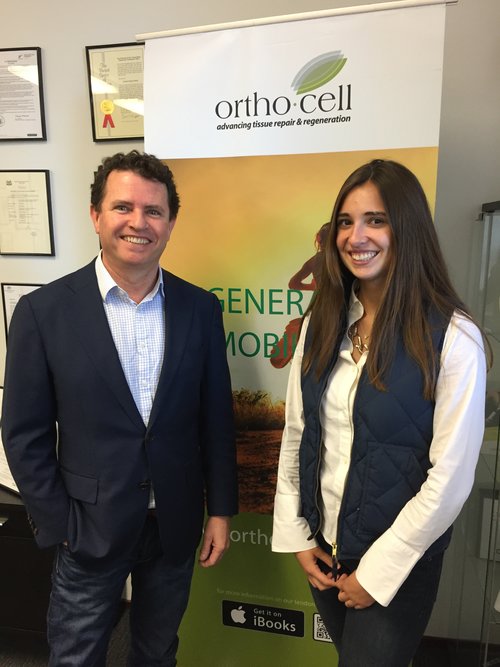
Paul Anderson (CEO, Orthocell) with Margaux Steltz
What university student would give up their hard-earned summer, leave their friends to vacation on the beach to move to the opposite hemisphere for the coldest weeks of winter to work as an intern? Penn State University biomedical engineering undergraduate student, Margaux Steltz would. And very happily.
Margaux is the fourth US college student to accept an internship with Orthocell in Perth. As winter arrived so did Margeux. On her first visit to Australia, and in fact, having never been this far from home, Margaux will spend a month in Australia at Orthocell.
‘It’s been an amazing experience so far,’ said Margaux. ‘It’s like nothing I’ve ever seen in a lab at school. I certainly now have a far better understanding of clinical research and quality management systems, she reflected. ‘Cell handling was neat, experience with a digital PCR, cutting bioderived collagen medical devices and then the complexities around shipping – it’s all been really great.’
Internships, particularly international experiences like these, add tremendous value for students in offering them insight into emerging technologies and preparing them for what the jobs of the future may look like.
‘One of the reasons US interns are coming to Australia, is to access high-quality internships with biotech companies driving the translation of medical research, said Paul Anderson, CEO Orthocell. ‘We’re really delighted to have super-talented undergraduates from Australia or the US at Orthocell, investing in their future and expanding our talent search on a global scale.’
‘To make the most out of an internship opportunity you really need to approach an internship not really expecting anything’ Margaux advised. ‘It’s important to stay open minded to the experience. Be willing to assist across multiple functions of the business, to help in any way you can’.
During her internship, Margaux has been able to experience the spectrum of the Orthocell business from handling raw materials through to understanding quality management systems and associated compliance standards and finally transport logistics.
‘I’ve been really surprised by how many checks and balances there are in the Orthocell product development and manufacturing process’, said Margaux. The company runs in such a diligent way with individuals accepting such a high degree of responsibility for the way in which the product is made and handled through to the clinic.’
‘I’ve probably enjoyed being involved in the manufacturing process the most – seeing how the scaffolding is made,’ said Margaux when asked about the elements of the internship that she has valued the most. ‘Learning from industry experts and the opportunity to put theory into practice. The manufacturing process is fascinating. I’m going to assist with the scaffold de-fatting process today.’
Reflecting upon her expectations and addressing the challenge, Margaux offered that coming into Orthocell was kind of intimidating at first. ‘But only because I’m going to be able to do something that not many others get to see and because I really wanted to be able to make the most of it.’
Her knowledge of bioscaffolds has advanced dramatically from theory to practice since being at Orthocell. ‘I guess I had a skewed understanding of bioscaffolds, but now with direct experience handling the materials, with a very practical view of the capabilities of the technology, I’ll go back to school with skills and experience that I know I can apply directly to my studies.’
One of the unexpected benefits of internships according to Marguex is that ‘Internships give an understanding of what it means to be part of and contribute to a high performing team. It sounds cliché but we have no experience that can prepare students for what it’s like being a part of a fast-moving biomedical company like this. ‘These experiences really shape a student’s view to know what to expect from an industry-based R&D role.’
‘Biomed right now is evolving so rapidly, it seems like anything is possible,’ said Margaux. ‘There is virtually no limit on what can be done to engineer solutions to some of medicine’s most complex and persistent problems. I’m really excited for the future of bioengineering. I certainly think I’m in the right place at the right time.’
